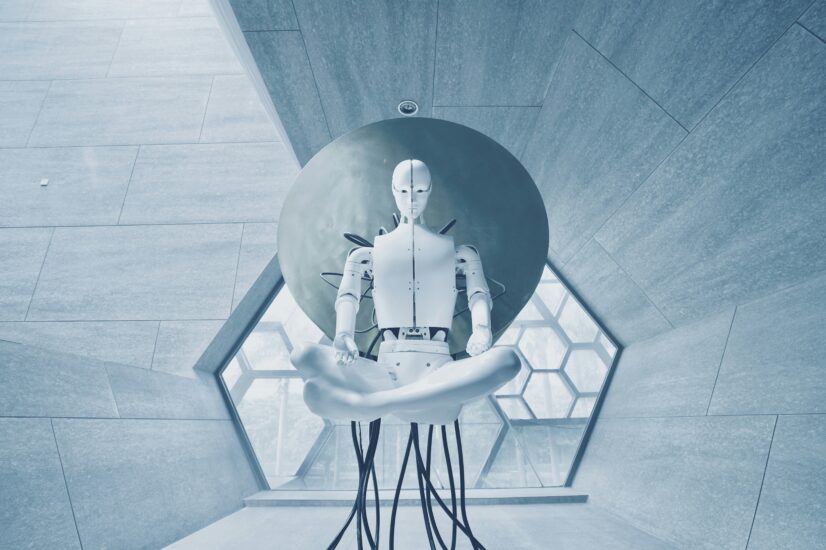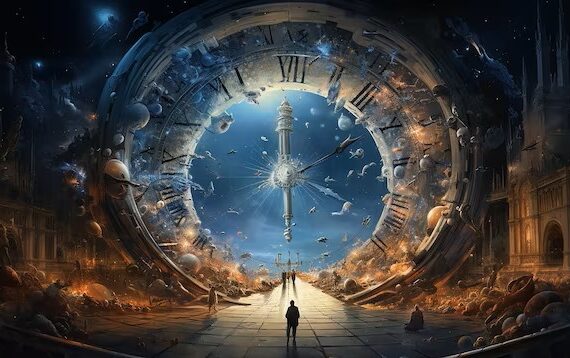From Outer Space to Artificial Intelligence: Exploring the Future-Predicting Power of Sci-Fi

From Outer Space to Artificial Intelligence: Exploring the Future-Predicting Power of Sci-Fi
Sci-Fi has long captured the imagination of people around the world, serving as a source of inspiration and wonder. From envisioning futuristic technologies to contemplating the mysteries of space, science fiction has shaped our collective vision of the future. This article delves into the profound influence of science fiction on our society and explores how its predictions have impacted technological advancements. We will examine the intersection of science fiction and real-world innovation, exploring the realms of space exploration and artificial intelligence.
Additionally, we will delve into the ethical implications of sci-fi concepts and evaluate the accuracy of their predictions. Moreover, we will uncover the role of science fiction in inspiring innovation and creativity, and how it continues to shape our future. Through this exploration, we will gain a deeper understanding of the power of science fiction as a driving force behind our technological progress and societal development.
1. Introduction: The Influence and Impact of Science Fiction
1.1 The Enduring Popularity of Science Fiction
Science fiction has captivated audiences for decades with its imaginative tales of futuristic worlds and groundbreaking technologies. From classic novels like “1984” and “Brave New World” to blockbuster movies like “Star Wars” and “The Matrix,” science fiction has remained a beloved genre across generations. Its popularity can be attributed to its ability to transport us to new and exciting realms while addressing deep-rooted human desires and fears.
1.2 Exploring the Connection between Science Fiction and Real-World Advancements
But science fiction is more than just entertaining escapism. It has the remarkable power to influence and shape real-world advancements. Many of the technologies we enjoy today were once mere figments of a sci-fi writer’s imagination. From futuristic gadgets to groundbreaking scientific theories, science fiction has often acted as a blueprint for real-world innovations. In this article, we will dive into the intriguing relationship between science fiction and the progress of human civilization.
2. Imagining the Future: How Sci-Fi Predictions Have Shaped Technological Advancements
2.1 Early Sci-Fi Visions of the Future
Long before smartphones and virtual reality, early science fiction pioneers like Jules Verne and H.G. Wells were envisioning a future filled with fantastical inventions. Verne’s “Twenty Thousand Leagues Under the Sea” foretold of submarines, while Wells’ “The War of the Worlds” imagined alien invasions and advanced weaponry. These early works not only entertained readers but also sparked the imagination of inventors and scientists.
2.2 Realization of Sci-Fi Concepts in Modern Technology
In recent years, we have seen numerous examples of science fiction concepts becoming a reality. Take, for instance, the “Star Trek” series, which introduced the concept of handheld communicators. Today, we carry smartphones that resemble the very devices imagined on the show. Similarly, the concept of virtual reality, popularized in movies like “The Matrix,” is now a thriving industry. Science fiction has played a significant role in inspiring inventors and pushing the boundaries of what is possible.

3. Space Exploration: From Sci-Fi Dreams to Reality
3.1 The Influence of Sci-Fi on Space Exploration Initiatives
Regarding space exploration, science fiction has been an integral part of inspiring and shaping our understanding of the cosmos. The works of authors like Arthur C. Clarke, with his famous “2001: A Space Odyssey,” ignited our fascination with space travel and exploration. Science fiction fueled our collective imagination and transformed what was once thought impossible into tangible goals for scientific exploration.
3.2 From Jules Verne to SpaceX: How Science Fiction Has Propelled Space Travel
The influence of science fiction on space travel extends beyond mere inspiration. Elon Musk, the founder of SpaceX, has openly acknowledged his love for sci-fi books and movies, which have played a significant role in his vision for the company. SpaceX’s commitment to reusable rockets and the eventual colonization of Mars mirrors the aspirations of many science fiction stories throughout the years. Science fiction has not only entertained us with its tales of outer space but has also influenced the direction of real-world space exploration initiatives.
4. Artificial Intelligence: Unraveling the Sci-Fi Inspiration behind AI Development
4.1 The Concept of Artificial Intelligence in Science Fiction
Artificial Intelligence (AI) has long been a fixture in science fiction narratives. From the sentient computer HAL in “2001: A Space Odyssey” to the highly advanced robots in “Blade Runner,” science fiction has explored the ethical and philosophical implications of creating intelligent machines. These stories have fascinated us with their depictions of AI as both helpful companions and potential existential threats.
4.2 Sci-Fi Depictions of AI and its Influence on Real-World AI Development
The influence of science fiction on the development of AI cannot be overstated. Concepts like natural language processing, machine learning, and autonomous robots, which were once purely the stuff of sci-fi, have now become integral components of real-world AI technologies. The race to create true artificial intelligence has been fueled, in part, by the compelling narratives and cautionary tales found within the pages of science fiction literature and on the silver screen.
As we continue to push the boundaries of human knowledge and technological advancements, science fiction will undoubtedly continue to play a crucial role in shaping the future. Its ability to inspire, challenge, and entertain ensures that it remains a source of limitless possibilities and boundless imagination.
5. The Ethics of Science Fiction: Exploring the Societal Implications of Futuristic Concepts
5.1 Ethical Dilemmas Portrayed in Science Fiction
Science fiction has always been a playground for exploring ethical conundrums. From Isaac Asimov’s Three Laws of Robotics to the moral quandaries faced by characters in “Black Mirror,” sci-fi poses thought-provoking questions about the implications of technological advancements. Whether it’s the ethics of cloning, artificial intelligence, or the balance between personal privacy and security, science fiction forces us to confront the potential consequences of our actions and decisions.
5.2 Examining the Impact of Sci-Fi on Ethical Discussions in Science and Technology
Beyond mere entertainment, science fiction has a profound impact on shaping ethical discussions in the world of science and technology. Sci-fi novels like Margaret Atwood’s “The Handmaid’s Tale” shed light on the dangers of a dystopian society, prompting us to reflect on the importance of upholding human rights and equality. Similarly, movies like “Blade Runner” challenge us to consider the implications of creating sentient beings with emotions. By presenting these ethical dilemmas in captivating narratives, science fiction stimulates conversations and encourages us to think critically about the choices we make.
6. Predictive Power: Examining the Accuracy of Sci-Fi in Predicting the Future
6.1 Notable Examples of Accurate Sci-Fi Predictions
While we may not have flying cars or teleportation devices just yet, science fiction has displayed an uncanny ability to predict future technologies. Take Jules Verne’s “20,000 Leagues Under the Sea,” which envisioned submarines long before their development. Or George Orwell’s “1984,” which, with its surveillance state and Big Brother, seems increasingly relevant in our digital age. These examples demonstrate sci-fi’s knack for anticipating societal shifts and technological advancements, often acting as a precursor to real-world innovation.
6.2 Dissecting the Factors Influencing the Accuracy of Sci-Fi Predictions
Although science fiction has had its fair share of accurate predictions, it’s important to acknowledge the factors that influence its foresight. Sci-fi writers often draw inspiration from current scientific and technological developments, extrapolating them into the future. However, the plausibility of their predictions is also contingent upon societal and economic factors. The feasibility of certain technologies, as well as public acceptance and adoption, play a crucial role in determining whether these predictions become a reality. Nonetheless, sci-fi’s ability to inspire scientists and engineers to turn dreams into inventions should not be underestimated.
7. The Role of Sci-Fi in Inspiring Innovation and Creativity
7.1 Sparking Imagination: How Sci-Fi Captivates Minds and Pushes Boundaries
Science fiction has an inherent ability to captivate our imaginations and expand the boundaries of what we perceive as possible. Through vivid descriptions, compelling characters, and mind-bending concepts, sci-fi transports us to worlds beyond our own. By challenging the status quo and pushing the limits of human imagination, science fiction fuels innovation and creativity. It encourages us to think beyond our current limitations and consider alternative paths for the future.
7.2 Sci-Fi as a Catalyst for Scientific and Technological Breakthroughs
Many scientific and technological breakthroughs have been inspired by science fiction. The iconic communicator device from “Star Trek” paved the way for modern smartphones. The concept of virtual reality, explored in works like “Neuromancer” by William Gibson, has become a reality thanks to advancements in computer graphics and sensory technology. Science fiction not only sparks ideas but also provides a framework for scientists and engineers to build upon. By envisioning possibilities that were once deemed impossible, sci-fi becomes a catalyst for transformative discoveries.
8. Looking Ahead: How Science Fiction Continues to Shape our Future
8.1 The Ongoing Influence of Science Fiction in Society
As science fiction continues to captivate audiences worldwide, its influence on society shows no signs of waning. Films like “Interstellar” inspire curiosity about the mysteries of the universe, while TV shows like “Stranger Things” evoke a sense of nostalgia and wonder. Science fiction serves as a mirror, reflecting our hopes, fears, and dreams for the future. It challenges us to question the direction in which we’re heading and encourages us to shape our destiny. By fostering dialogue, inspiring innovation, and igniting the imagination, science fiction remains a powerful force in shaping our collective future.
Conclusion
As we conclude our exploration of the future-predicting power of science fiction, it becomes evident that this genre has had a profound impact on our world. From the pages of science fiction novels to the silver screen, these imaginative tales have shaped our technological advancements, influenced our ethical discussions, and fueled our creativity. Science fiction continues to serve as a source of inspiration, pushing the boundaries of what is possible and challenging us to envision a better future. So, let us embrace the power of science fiction and its ability to guide us toward a future limited only by the bounds of our imagination.
FAQ
1. How accurate are the predictions made by science fiction?
The accuracy of predictions made by science fiction varies. While some concepts have become reality, others remain purely fictional. Technological advancements, societal shifts, and scientific discoveries can influence the accuracy of these predictions. It is important to remember that science fiction is primarily driven by imagination rather than scientific certainty.
2. What role does science fiction play in inspiring real-world innovation?
Science fiction serves as a wellspring of inspiration for innovators and creators. By presenting imaginative concepts and futuristic possibilities, science fiction encourages us to think outside the box and push the boundaries of what is possible. Many technological advancements, including smartphones, virtual reality, and voice recognition systems, have been influenced by ideas first introduced in science fiction.
3. How does science fiction influence ethical discussions?
Science fiction often explores complex ethical dilemmas, raising thought-provoking questions about the consequences of scientific and technological advancements. By presenting scenarios that challenge societal norms and values, science fiction stimulates ethical discussions and encourages us to consider the potential risks and benefits of emerging technologies.
4. What is the lasting impact of science fiction on our future?
The impact of science fiction on our future is profound and enduring. It not only shapes our technological advancements but also influences our aspirations and goals as a society. Science fiction encourages us to dream big, contemplate the possibilities, and strive for a better future. By envisioning alternative worlds and realities, science fiction continues to inspire and guide us on our path of progress.
Thank you for reading 🙂













